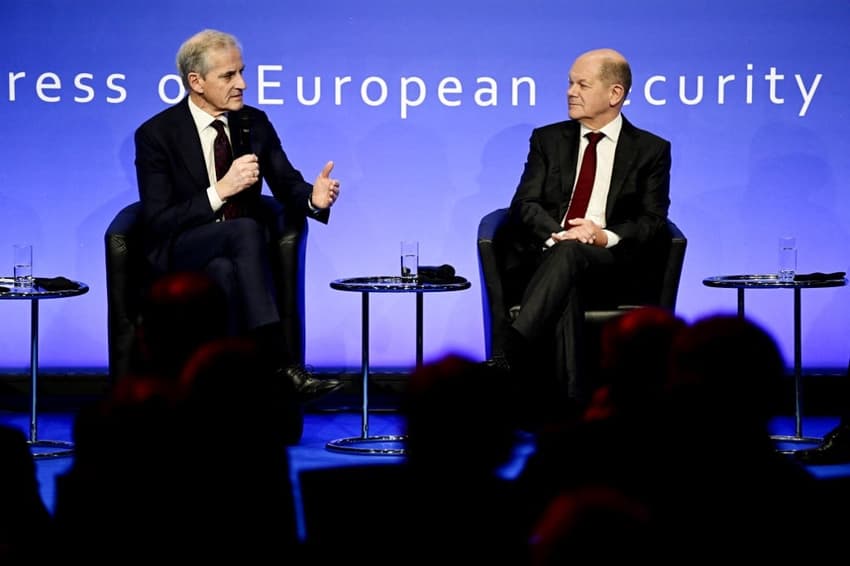Norway and Germany seek Nato-led cooperation for key undersea structures

Germany and Norway want to start a NATO-led alliance to protect critical underwater infrastructure, their leaders said on Wednesday, weeks after explosions hit two key gas pipelines in the fallout from the war in Ukraine.
"We are in the process of asking the NATO Secretary General to set up a coordination office for the protection of underwater infrastructure," German Chancellor Olaf Scholz told a press conference in Berlin.
"We take the protection of our critical infrastructure very seriously and nobody should believe that attacks will remain without consequences," he said.
Norwegian Prime Minister Jonas Gahr Store said the alliance would be "an informal initiative to exchange between civilian and also military actors" with NATO providing "a centre, a coordination point".
Underwater cables and pipelines were "arteries of the modern economy" and it was necessary to create "a coordinated joint effort to ensure security for this infrastructure", he said.
Scholz said he and Store would propose the plan to NATO Secretary General Jens Stoltenberg, who is due in Berlin for a security conference. The Nord Stream 1 and 2 gas pipelines off the Danish island of Bornholm were targeted by two huge explosions at the end of September.
The pipelines, which connect Russia to Germany, had been at the centre of geopolitical tensions as Moscow cut gas supplies to Europe in suspected
retaliation to Western sanctions over the invasion of Ukraine.
Although they were not in operation when the leaks occurred, they both still contained gas which spewed up through the water and into the atmosphere.
Russia and Western countries, particularly the United States, have traded bitter barbs over who is responsible for the blasts.
Several European countries have since taken steps to increase security around critical infrastructure.
The G7 interior ministers warned earlier this month at a meeting in Germany that the Nord Stream explosions had highlighted "the need to better protect our critical infrastructure".
Norway has become Europe's main gas supplier in the wake of the war in Ukraine, taking the place of Russia.
The Scandinavian country has a vast network of pipelines, stretching for almost 9,000 kilometres, linking it to the continent, which experts have said are at risk of sabotage.
Comments
See Also
"We are in the process of asking the NATO Secretary General to set up a coordination office for the protection of underwater infrastructure," German Chancellor Olaf Scholz told a press conference in Berlin.
"We take the protection of our critical infrastructure very seriously and nobody should believe that attacks will remain without consequences," he said.
Norwegian Prime Minister Jonas Gahr Store said the alliance would be "an informal initiative to exchange between civilian and also military actors" with NATO providing "a centre, a coordination point".
Underwater cables and pipelines were "arteries of the modern economy" and it was necessary to create "a coordinated joint effort to ensure security for this infrastructure", he said.
Scholz said he and Store would propose the plan to NATO Secretary General Jens Stoltenberg, who is due in Berlin for a security conference. The Nord Stream 1 and 2 gas pipelines off the Danish island of Bornholm were targeted by two huge explosions at the end of September.
The pipelines, which connect Russia to Germany, had been at the centre of geopolitical tensions as Moscow cut gas supplies to Europe in suspected
retaliation to Western sanctions over the invasion of Ukraine.
Although they were not in operation when the leaks occurred, they both still contained gas which spewed up through the water and into the atmosphere.
Russia and Western countries, particularly the United States, have traded bitter barbs over who is responsible for the blasts.
Several European countries have since taken steps to increase security around critical infrastructure.
The G7 interior ministers warned earlier this month at a meeting in Germany that the Nord Stream explosions had highlighted "the need to better protect our critical infrastructure".
Norway has become Europe's main gas supplier in the wake of the war in Ukraine, taking the place of Russia.
The Scandinavian country has a vast network of pipelines, stretching for almost 9,000 kilometres, linking it to the continent, which experts have said are at risk of sabotage.
Join the conversation in our comments section below. Share your own views and experience and if you have a question or suggestion for our journalists then email us at [email protected].
Please keep comments civil, constructive and on topic – and make sure to read our terms of use before getting involved.
Please log in here to leave a comment.